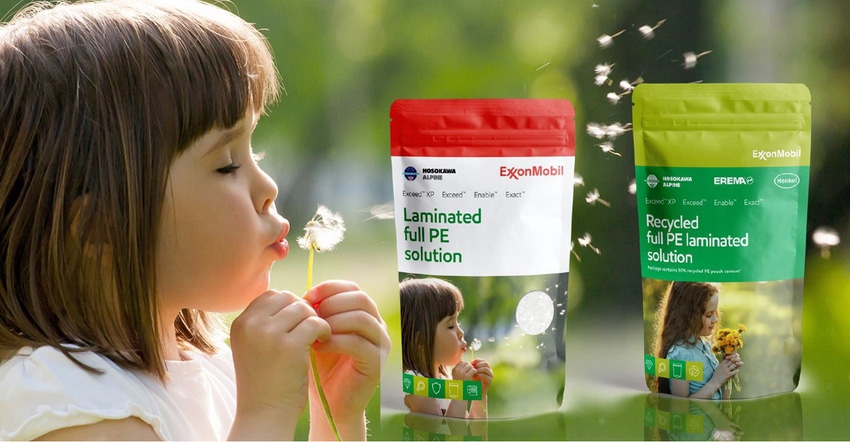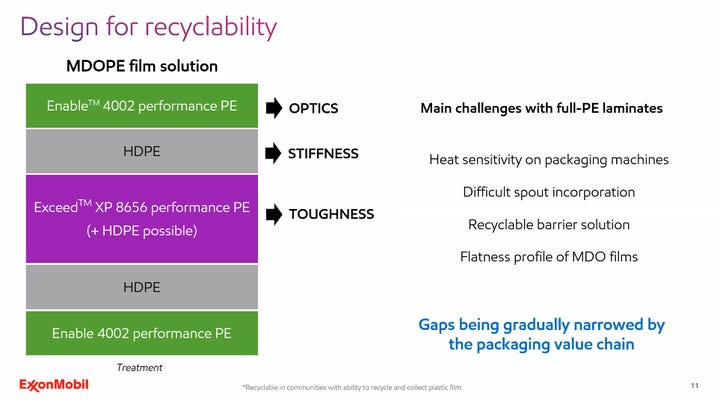Recyclable Flexible PE Packaging Gains and Gaps
ExxonMobil discussed hot-button topics like monomaterial polyethylene pouches, an advanced recycling trial, and circular polymers in a sustainably themed webinar.

“May you live in interesting times.” The Chinese saying that appears encouraging on the surface belies an undercurrent of uncertainty and challenges is as timely today as ever.
That proverb came to mind during an ExxonMobil webinar earlier this month entitled “Future Trends in the Flexible Packaging Industry” that centered on designing for recyclability. Presenter Glenn Williams, the company’s primary packaging development lead, said “we’re in an interesting time for the polyethylene flexible packaging industry, with rising innovation, collaboration, and complexities.”
He unpacked the topic in noting the gains and gaps by first identifying four mega trends affecting this market:
The growth in emerging economies;
Sustainability, especially a move away from single-use plastic;
New purchasing behaviors and expectations; and
Emerging technologies including Industry 4.0, Internet of Things, artificial intelligence (AI), and Big Data.
“AI is important in recycling via digital watermarks,” he pointed out.
Flexible packaging is increasing in the rapidly accelerating ecommerce markets spurred by in a shift toward increased packaging convenience.
At the heart of flexible packaging growth is the increase in the middle class, especially in fast-growing countries like China, he noted.
With a focus on US/Canada markets, he pointed out that the overall driver in sustainability in the flexibles market is for downgauging. Related trends including increased post-recycle (PCR) content, designing for recyclability, and advanced recycling.
ExxonMobil has completed the initial phase of a plant trial at the company’s facilities in Baytown, TX, using a proprietary advanced recycling process for converting plastic waste into raw materials for production of high-value polymers. According to Williams, “this targets a circular solution for difficult-to-recycle materials” from industrial, agricultural, and construction markets.
Circularity for ExxonMobil means ISCC+ circular polymers that have been certified through the International Sustainability and Carbon Certification Plus (ISCC+) process. The company plans to market certified polymers later this year from advanced recycling of plastic waste.
ExxonMobil intends to use results from the Baytown trial to scale-up advanced recycling capabilities at other global facilities, targeting a circular solution for converting difficult-to-recycle plastic waste into feedstock for virgin-quality plastic.
Filling performance “gaps” in recyclable flexibles.
According to Williams, the developmental direction of flexible packaging is toward monomaterial formats with all or a majority of the structure being polyethylene (PE). Williams is seeing a “lot of growth” in biaxially oriented PE (BOPE) and machine-direction oriented PE (MDOPE), which offers “exceptional optical performance."
A major challenge is the sealing of these materials on vertical form-fill-seal machines due to heat distortion, so the machines must run at lower speeds especially when adding spouts to pouches.
Another challenge is increasing oxygen barriers where ethylene vinyl alcohol (EVOH) is in the lead position.

As well, ExxonMobil is “working hard” to reduce polyamide (PA, aka nylon) in films, he reported. To-date, PA in flexible packaging can be reduced up to 30% while increasing puncture-resistance. The next stage is to replace PA, “which is a significant” challenge that includes combining current barriers or using new polymers.
During the pandemic Williams has seen a lot of rationalization of stock-keeping units. Yet, amid the cutback, a study that showed 8% growth for stand-up pouches, he added. And while institutional food packaging declined, ecommerce accelerated — an astonishing 40% growth in 2020, he noted. Ecommerce also exprienced an increase in direct-to-consumer (DTC) delivery and ships-in-own-container (SIOC) designs that Williams believes is a boost for plastic and flexible alternatives.
He also pointed to an increase in bag-in-box (BIB) and refill pouches that align with the trend away from single-use plastics.
In conclusion, Williams stated that “flexibles with the right design and materials are in a good growth position.”
About the Author(s)
You May Also Like




